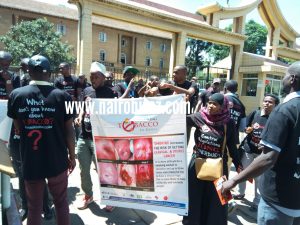
The tough regulatory sanctions imposed by the Government on cigarette manufacturers and importers to safeguard public health are here to stay after the Court of Appeal ruled they were reasonable and justified.
The three-Judge bench held that the Health ministry regulations satisfied statutory and constitutional requirements since their enactment was preceded by exhaustive consultations with all tobacco industry players and public participation.
The Appellate bench upheld the decision made on March 24, last year, by High Court Judge Mumbi Ngugi giving the greenlight to the Health ministry to fully implement the legal provisions.
The pronouncement was lauded by the Chairman of the Kenya Tobacco Control Board, Prof. Peter Odhiambo, the Chairman of the Tobacco Control Alliance, Joel Gitali and the Director of Public Health, Dr Kepha Ombacho.

“It is our prayer the government implement the tobacco control policies in the country and we should move forward to prevent death, diseases and disabilities. In fact we are told many Kenyans lose their lives every year because of tobacco but no one talks it or seem to talk about it but we want to ensure we prevent Kenya from failing to that tobacco epidemic ” Said Gitali while speaking to Nairobi Times after the judgement.
“The Regulations and the Tobacco Act are neither unconstitutional nor unlawful. They do not unlawfully violate any rights of BAT, Mastermind Tobacco or the tobacco industry players. In cases where the regulations or the Act limits the rights of the industry players, the same is reasonable and justified in accordance with Article 24 of the Constitution,” Appeal Judges Hannah Okwengu, Festus Azangalala and Fatuma Sichale said in their 44-page judgment read on Friday by Justice Jamila Mohamed.
They observed that Justice Mumbi had invalidated Regulations 1, 13(b) and 45 regarding health effects on smoking but said there was urgent need to balance public health interests and the rights of the public against commercial interests. She had directed the ministry, cigarette manufacturers and all stakeholders to resolve technical issues regarding health warnings.
“It is clear that the purpose of the regulations prescribing health warnings through packaging and labeling of tobacco products was to achieve the objects of the Tobacco Act by providing information and cautioning consumers and non-consumers of the side-effects of tobacco products,” Justices Okwengu, Azangalala and Sichale pointed out.

They said Regulations 12-14 related to product disclosures on the ingredients used in the manufacture of cigarettes “which may to some extent expose or compromise the interests of BAT and other players in the tobacco industry by infringing on their intellectual property rights.”
“These disclosures are relevant and did not violate their privacy or intellectual property tights. The disclosure was aimed at identifying the products’ ingredients used by tobacco manufacturers to ensure that public health authorities have full information to protect public interest,” the appellate bench said.
“BAT has not denied that tobacco products have negative health effects not only to the consumers but even other innocent persons who become passive smokers by inhaling second-hand smoke. Therefore, there are public health needs that have to be balanced against the intellectual property rights of BAT and other tobacco industry players, in order to determine whether limitation of BATs intellectual property right is justified,” the court observed.
Sections 2, 32 and 33 of the Tobacco Act imposes an obligation to protect other individuals from second-hand smoke. Regulation 15 (b) has gone further to prohibit smoking in streets walkways or verandahs adjacent to a public place.
“The side-effects of second-hand smoke are well documented and it is evident that the purpose of this regulation is to protect those who do not smoke, particularly children, from inhalation of second-hand smoke,” the three-Judge bench said.

In a ruling dated June 4 2015, the Court issued interim orders restraining the implementation of the regulations pending hearing and determination of the petition.
Kenya’s leading cigarette manufacturer BAT said that the Regulations had a substantial direct and indirect effect on their business and that of other players in the tobacco industry.
The health ministry also introduced a solatium compensatory contribution meant to share the cost of handling tobacco consumption related diseases and other health complications caused by tobacco consumption and use.
Nevertheless, BAT said the contribution is unconstitutional and unlawful because the amount set was without any reference to a determination of a lawful obligation to pay compensation or as to the amount.
“That the said contribution is discriminatory as other industries, including those that deal in controlled substances, have not been subjected to similar measures,” they claimed.
They also said that the solatium compensatory contribution is primarily meant to punish tobacco manufacturers and importers for engaging in what is legal trade in the tobacco industry.
BAT also contested a directive requiring it have a pictorial warning on its cigarette packs.
They said, “the warning requirements under the Regulations are not necessary or proportional. The public, including youth, are already well informed of the risks of smoking. There is no evidence to show that the warnings are not seen and assimilated by consumers or that trademarks neutralise consumers’ existing awareness of the risks of smoking.”

The cigarette producers said that the real drivers of smoking initiation are factors such as personal influence, risk preferences, peer influence, socioeconomic factors, access and price, and that pictorial health warnings have not been shown to reduce smoking or significantly alter beliefs and intentions about smoking.
Another ministry proposal prohibiting smoking in streets, walkways and verandas adjacent to public places was also contested.
In his response, then Health CS James Macharia sets out the effects of tobacco usage in Kenya and asserted that the Regulations are intended to effectively implement the life-saving measures already contained in the Tobacco Control Act.
It was his averment that the regulations were enacted in order to address the negative effects of tobacco use which he said has impacted negatively on the lives of the people of Kenya, the economy and the environment.
He also dismissed a challenge that warning labels are not highly effective in reducing tobacco consumption.
He said “that research has established that large, graphic warning labels on tobacco products is an effective way to inform consumers about the harmful impact of tobacco, encourage users to quit and deter non-users from starting smoking.”
The CS also said that vulnerable groups such as low-literacy people, children, and minorities can understand images more than writings.
According to the WHO framework convention, CS Macharia said states parties should adopt effective national legislation and actively promote effective regulations that requires 100% smoke-free environments in all indoor public places, indoor workplaces on all means of public transport, and, as appropriate, other public places with no exceptions that provide for smoking zones.
The health minister also asserted that the disclosures are required as tobacco products contain over 400 harmful ingredients which need to be regulated, controlled and their quantity monitored.
Justice Mumbi Ngugi agreed with the CS saying that the effects of a product on the health rights of others cannot be divorced from the process and need for its regulation.
“it is my view that such requirements and disclosure outweigh the intellectual property rights pertaining to tobacco products,” she said.
Judge Ngugi said that the Tobacco Control Act has very clear objectives of safeguarding individuals and the public from the dangers posed by consumption of tobacco, which cause debilitation, disease, and death.
The Regulations impugned in this petition are intended to safeguard the public, those who smoke and those who do not, and to provide certain information with regard to the contents of tobacco products






